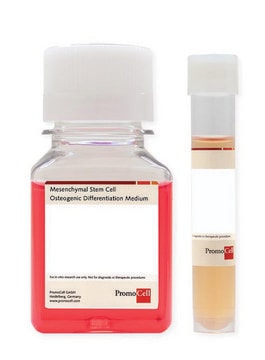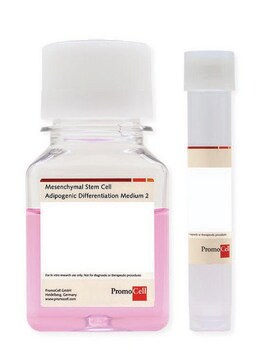SCR020
Mesenchymal Adipogenesis Kit
Mesenchymal Stem Cell Adipogenesis Kit typically obtains 30% mature adipocytes from the rat bone marrow derived mesenchymal stem cells.
Synonyme(s) :
Adipocyte Differentiation Media
About This Item
Produits recommandés
Niveau de qualité
Fabricant/nom de marque
Chemicon®
Technique(s)
cell culture | stem cell: suitable
Entrée
sample type mesenchymal stem cell(s)
Description générale
Excessive weight gain and obesity pose significant health challenges to many industrialized nations. Many metabolic disorders associated with cardiovascular diseases such as diabetes and atherosclerosis are directly linked to the increased production and size of adipose cells. Understanding the molecular mechanism that underlie adipogenesis, the process by which adipose or fat tissue is formed, is thus of critical importance. Elucidation of the steps involved in adipogenesis, including terminal differentiation, have been facilitated in large part by the development of pre-adipocyte cell lines such as the Swiss 3T3-L1 mouse model (Please refer to CHEMICON′s Adipogenesis Assay Kit, Catalog No. ECM950). However using these model systems to study some of the earliest events in cellular differentiation are problematic as these cells are already lineage-restricted and pre-determined to become adipocytes.
Stem cell technology, particularly embryonic stem cells and/or mesenchymal stem cells offer attractive alternative sources of adipocytes for tissue culture studies and for the biochemical dissection of the earliest steps involved in adipose cell determination. Mesenchymal stem cells are multipotent progenitor cells that have the capacity to differentiate into several mesenchymal cell lineages, including bone, cartilage and fat.
Millipore′s Mesenchymal Stem Cell Adipogenesis Kit contains reagents that readily differentiate mesenchymal stem cells to an adipogenic lineage as assessed with Oil Red O staining of lipid vacuoles in mature adipocytes. These factors include dexamethasone, IBMX, insulin and indomethacin. Along with Oil Red O staining solution, a hematoxylin solution is provided to counterstain the cell nucleus.
Using Millipore′s Mesenchymal Stem Cell Adipogenesis Kit, we typically obtain >30% mature adipocytes from the rat bone marrow derived mesenchymal stem cells. Efficiency of adipogenic differentiation may vary, depending upon the quality of the mesenchymal stem cells and if variations to the protocol are introduced.
For Research Use Only; not for use in diagnostic procedure.
Application
Stem Cell Research
Composants
IBMX Solution: (Catalog No. 90355) One vial containing 250 μL of 0.5 M 3-isobutyl-1-methylxanthine (IBMX) in DMSO. Store at -20°C.
Insulin Solution: (Catalog No. 90356) Two vials containing 250 μL of 10 mg/mL recombinant human insulin. Store at -20°C.
Indomethacin Solution: (Catalog No. 2003626) Three vials containing 1 mL of 10 mM Indomethacin in methanol. Store at -20°C.
Oil Red O Solution: (Catalog No. 90358) One bottle containing 60 mL 0.36% Oil Red O Solution in 60% isopropanol. Store at room temperature.
Hematoxylin Solution: (Catalog No. 2003732) One bottle containing 50 mL Hematoxylin. Store at room temperature.
Stockage et stabilité
Dexamethasone Solution, IBMX Solution, Insulin Solution and Indomethacin Solution should be stored at -20°C. Oil Red O and Hematoxylin Solutions should be stored at room temperature. Storage of Oil Red O Solution at -20°C may result in formation of insoluble precipitates and is not recommended. If Oil Red O solution forms a precipitate, remove particulates by passage through a 0.22 or 0.45-micron filter.
Precautions:
Oil Red O stains skin and clothing. IBMX, Dexamethasone and Indomethacin are irritants and potentially toxic. DMSO is readily absorbed through the skin. Wear a lab coat and gloves when handling these solutions.
Isopropanol is flammable. Keep solutions containing isopropanol (Oil Red O Solution) away from open flames.
Informations légales
Clause de non-responsabilité
Mention d'avertissement
Danger
Mentions de danger
Classification des risques
Acute Tox. 3 Dermal - Acute Tox. 3 Inhalation - Acute Tox. 3 Oral - Eye Irrit. 2 - Flam. Liq. 2 - Repr. 1B - STOT RE 2 Oral - STOT SE 1 - STOT SE 2 - STOT SE 3
Organes cibles
Central nervous system, Eyes, Kidney
Code de la classe de stockage
3 - Flammable liquids
Point d'éclair (°F)
48.2 °F
Point d'éclair (°C)
9 °C
Certificats d'analyse (COA)
Recherchez un Certificats d'analyse (COA) en saisissant le numéro de lot du produit. Les numéros de lot figurent sur l'étiquette du produit après les mots "Lot" ou "Batch".
Déjà en possession de ce produit ?
Retrouvez la documentation relative aux produits que vous avez récemment achetés dans la Bibliothèque de documents.
Les clients ont également consulté
Notre équipe de scientifiques dispose d'une expérience dans tous les secteurs de la recherche, notamment en sciences de la vie, science des matériaux, synthèse chimique, chromatographie, analyse et dans de nombreux autres domaines..
Contacter notre Service technique











